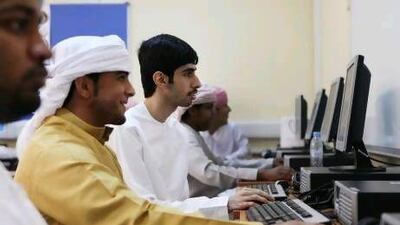ABU DHABI // Thousands of students turned up to the new national vocational training college yesterday as it opened after its expansion was announced over summer.
The seven campuses of the Abu Dhabi Vocational Education and Training Institute (Adveti) are taking on many of the less academic Emiratis who would in the past have attended the Higher Colleges of Technology.
HCT, traditionally the most vocationally focused of the three federal universities, has raised its admissions standards this year, with those who fail to make the grade being offered places at Adveti.
To accommodate them all, Adveti has opened three new campuses, in Sharjah, Fujairah and Ras Al Khaimah.
And despite fears that few would take up their places, about 60 per cent of those with offers turned up yesterday.
The Jazira Institute in Abu Dhabi now has 1,800 students, up from 500 last year. Its director, Adel Al Ameri, said it was "drowning in students", although staff had spent the past few weeks preparing for the influx.
New students will take a one-year intensive course in English before embarking on a diploma in subjects such as tourism and human-resources management.
The aim is to curb the high drop-out rate among the less academic Emirati school leavers. With the federal universities teaching most courses only in English, the majority of school leavers have to take a year or more of remedial lessons in the language before starting their degrees.
But many do not make it that far, with up to 20 per cent dropping out in the first year. The problem is particularly acute among men, who have enticing jobs offers from the military or police.
The move to vocational training is an attempt to keep them in the education system to prepare them for careers.
Dr Kathleen Hodge, managing director of Adveti, said student numbers had met her expectations. Most encouraging, she said, was the number of men - about 40 per cent of the total.
"We've had a fantastic number of men," Dr Hodge said. "Adveti is usually only around one third male but we've seen this become much more equal."
Making Adveti offers through the National Admissions and Placement Office (Napo), which handles federal university admissions, had added credibility to the institution, she said.
"It gives people the trust," Dr Hodge said. "Before now people didn't really know what [Adveti] was, but that's changing.
"It will be a slow process but word of mouth is so important, and with more students this will change. It's a case of getting the word out."
Mansour Al Siyabi, 21, started at Adveti this week after being turned down for his first choice, UAE University.
Despite having studied the language at school, he struggles to spell his name in English. He said Adveti was the best place for him to improve.
And Mr Al Siyabi was proud to be among the first to be offered a place under the new system.
"We will be the role models for the next students who come here," he said.
There were others who had come to Adveti after struggling with English at federal university. Some had taken 15 hours of classes every week for up to two years, but were still not confident.
Salma Nasser, 20, was on Zayed University's remedial course for two years, repeating the IELTS (International English Language Teaching System) test six times, at Dh800 a time. Now she has started at Adveti.
"It's easier to get into higher education through a diploma," Ms Nasser said. "It's too much of a jump from foundation into a degree. The design of this programme will give me a better chance to do well in my degree."
She hopes to begin working once she has her diploma in human-resource management, which will help her to support herself through a degree.
"This way I can have work experience and study part time," Ms Nasser said.
Kawthar Mohamed, 20, came from HCT's Abu Dhabi Women's College. She will now take remedial English at Adveti, followed by a two-year diploma in interior design.
"After that I'll have a qualification that I can get a job with instead of waiting four years to have a degree," Ms Mohamed said. "I want to get a job."
Dr Hodge said making offers through Napo was the first step in giving even greater access to higher education and, in turn, a more employable pool of young Emiratis.
"Diversity [of institutions] is the next step to opening up the work force to Emiratisation," she said.

